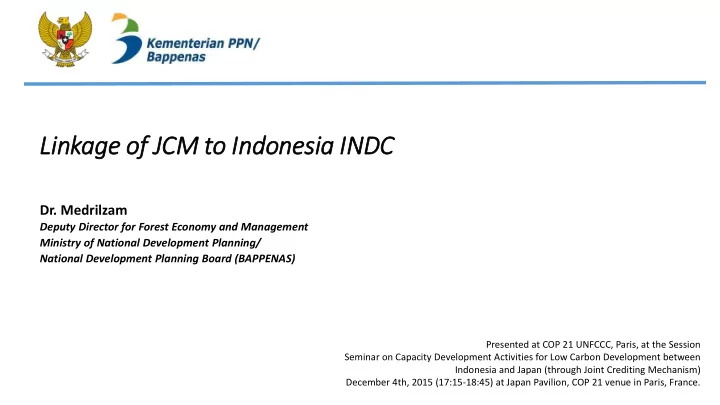

Li Linkage of f JCM to In Indonesia IN INDC Dr. Medrilzam Deputy Director for Forest Economy and Management Ministry of National Development Planning/ National Development Planning Board (BAPPENAS) Presented at COP 21 UNFCCC, Paris, at the Session Seminar on Capacity Development Activities for Low Carbon Development between Indonesia and Japan (through Joint Crediting Mechanism) December 4th, 2015 (17:15-18:45) at Japan Pavilion, COP 21 venue in Paris, France.
Indonesia Emission Reduction Target in 2030 UNCONDITIONALITIES CONDITIONALITIES:
Indonesia Emission Baseline: 2000-2030 (Result of RAN GRK Review) (thousands ton CO2e) 2.881 Gton CO2e in 2030 as stated in 3000000 INDC 2500000 2000000 1500000 1000000 500000 0 2000 2001 2002 2003 2004 2005 2006 2007 2008 2009 2010 2011 2012 2013 2014 2015 2016 2017 2018 2019 2020 2021 2022 2023 2024 2025 2026 2027 2028 2029 2030 Energi dan transportasi IPPU Limbah AFOLU (no peat) Peat Dekomposisi Peat Fire
SHIFT OF EMISSION SOURCES Share Baseline Emission in 2020 Share Baseline Emission in 2030 Share Baseline Emission in 2010 IPPU IPPU IPPU 3% 3% 3% Peat Fire Peat Fire 8% 14% Peat Fire Peat 23% Peat Decomposition Energy Decomposition 16% 29% Energy 10% Energy 50% Peat Afolu (no peat) Afolu (no peat) 46% Decompositio 13% 17% n Waste 19% Afolu (no 7% Waste peat) Waste 10% 19% 10% Emission from energy sector will supersede the land based emission in the future indicate that Indonesia economy will move toward industrial countries.
Pol olic icy exercises base ased on on: RP RPJMN 20 2015 15-2019 an and 2 2 Poli olicies Sce cenarios (F (Fair ir an and Ambitious) for or 20 2020 20-2030 2030 SEKTOR MEASURES • 1. LAND BASED (FOREST, PEAT Forest fire prevention measures • AND AGRICULTURES) Tree planting program • Moratorium issuing any new permits in primary forest and peatland areas, which covers 34% of Indonesian territory. • More stringent regulations and enforcement actions to reduce peat fires and the subsequent conversion of peatlands to agriculture uses • Sustainable agriculture practices • 2. ENERGY BASED Clean coal technology • (TRANSPORTATION AND Increase of the use of gas powered generation • ENERGY) Renewable energy goals • Energy intensity to improve by 1% per year • A reduction in fossil fuel subsidies • Public transport measures • Efficiency standards for automobiles to reflect world standards • Fuel-switching from gasoline to natural gas/CNG (the cooperation between Min of Transport, Min of Industry, MEMR) • Biofuel use will be increased in diesel fuel and in gasoline 3. IPPU optimum ratio for clinker in the cement industry 4. WASTE Methane capture from landfills in urban area by 2030 and the adoption of better waste management practices.
Baseline Emission Indonesia vs RPJMN+2 Policy Scenarios (in 000 ton CO2e) 3,500,000 Fair Scenario: Emission reduction 832 Mton CO2e 3,000,000 or about 29 % of baseline 2030 2,500,000 2,000,000 1,500,000 Ambitious: Emission reduction 1,000,000 1,19 Giga ton CO2e or about 41 % of baseline 2030 500,000 - 1995 2000 2005 2010 2015 2020 2025 2030 2035 Baseline BAU Total Emisi Baseline Total Emisi Skenario Fair Baseline Total Emisi Skenario Ambisius
In Indonesia commitment to vario ious sources of fin inancing in in IN INDC: …. Indonesia’s addition al 12% of intended contribution by 2030 is subject to provision in the global agreement including through bilateral cooperations, covering technology/ deployment and transfer, capacity building, payment for performance mechanisms, technical cooperation and access to financial resources. …. Indonesia will meet its unconditional commitments regardless of the existence of international market mechanisms. Indonesia welcomes bilateral, regional and international market mechanisms that facilitate and expedite technology development and transfer, payment for performance, technical cooperation, and access to financial resources to support Indonesia’s climate mitigation and adaptation efforts toward a climate resilient future.
Challe llenges to apply vario ious sources of fin inancing, g, in inclu luding JC JCM: International Context: • No clear signal by UNFCCC whether “various sources” will be part of the post 2020 agreement; • FVA (Framework for Various Approach) and NMM (New Market Mechanism) is unclear and not clearly defined; • No clear reference to market in ADP draft text; • Scheme of transfer technology and capacity building is somewhat vague in the UNFCCC; Local Context: • No integrated registry established at the national level; • Enabling conditions should be improved; • No integrated carbon credit agreed;
Thank you for your attention Further Contact: Dr. Medrilzam Medrilzam.Medrilzam@gmail.com medril@bappenas.go.id
Recommend
More recommend